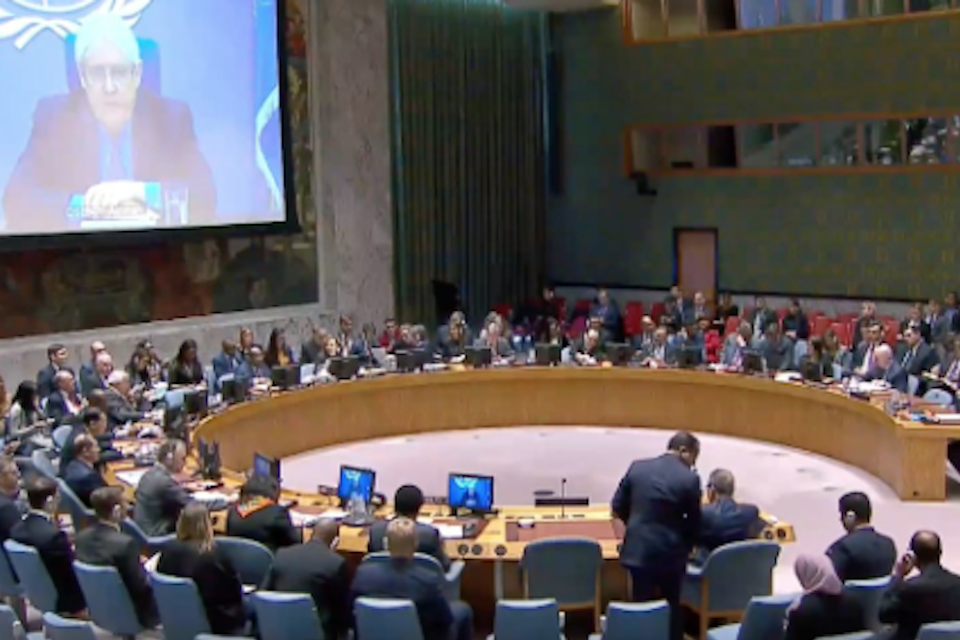Meaningful implementation of humanitarian assistance in Yemen
Statement by Ambassador Karen Pierce, UK Permanent Representative to the UN, at the Security Council Briefing on Yemen

Thank you, Mr President. Once again, our thanks to the Special Envoy and to Mark Lowcock for all their work and the dedication of them and their teams. I think, given what we’ve heard of what Martin and Mark said about the involvement of ICRC and World Food Programme in some of the things that have been going on on the ground, I also want to use this occasion if I may to pay tribute to those organisations and everything they are doing to try and make the lives of people in Yemen – ordinary citizens in Yemen – easier. And we welcome General Lollesgaard to his new post and thank General Cammaert for his contribution.
I’ll be brief, Mr President because we will have a closed session later with Mark and Martin and also with the General. I think we very much welcome the progress that’s been made very recently over the weekend. It’s particularly good news about the ports of Salif and Ras Isa. And we look forward to what will happen in the next phase with Hodeidah port and parts of the city. As Mark’s briefing brought out, access to the Red Sea Mills was always vital. And I think we’re running out of superlatives for the word ‘critical.’ But it’s obvious that we have to be able to have the humanitarian agencies get access to the food supplies there. So these steps towards that access are extremely welcome. As Martin’s own briefing brought out, Mr President, we need meaningful implementation to begin. It’s extremely welcome that the parties have been able to work closely with Martin, and the commitments that they have given the Special Envoy are extremely necessary. But I think what both Mark and Martin’s briefings brought out is how important it is that these commitments get translated into meaningful practice on the ground.
I wanted to say a word, if I may, about standing up at the UN mission. It’s obvious that this too has an important role to play in getting the implementation underway and making sure implementation is comprehensive. I know there have been some teething problems with some of the logistical arrangements for the mission so I’d like to use this opportunity, Mr President, to call on all the parties to do their utmost to ensure that the commission personnel can get in and do their work.
Martin said some encouraging things about tackling the prisoner exchanges and the need to finalise those. I think we all know that that’s a crucial confidence building measure, as is a commitment to the next round of talks.
But I wanted, particularly, to echo what Martin said about the need for Taiz – for small steps now and not big steps later. I think that’s absolutely important. There’s often, in peace processes, a feeling that one should always go for the biggest outcome possible and of course in principle that is right. But the people of Yemen, as we heard very eloquently today from our briefers, the people of Yemen need to see tangible results and they need to see them fast. So I think small steps now is absolutely right.
And I think probably, Mr President, on the political process overall, a careful, incremental steps forward is probably the way to go. Martin set out the difficulties and we recognise that the peace and the momentum that’s been achieved so far remains fragile. But nevertheless if we are to try and bring peace and help to the people of Yemen who have suffered for so long, we need to keep going no matter what the difficulties. Mark very eloquently set out how the challenges on the humanitarian side remains dire. And also I was very worried about what he had to say about operations grinding to a halt. The urgency of making progress can’t be underestimated. And we hope that the pledging conference on 26 February in Geneva will be able to give a boost to these important efforts.
But I just want to conclude, Mr President, by just underscoring that longer term move towards a political settlement, towards a more representative settlement in Yemen. It’s absolutely vital for the peace, security and stability of the country and the health and well-being of the Yemeni people. Thank you very much.